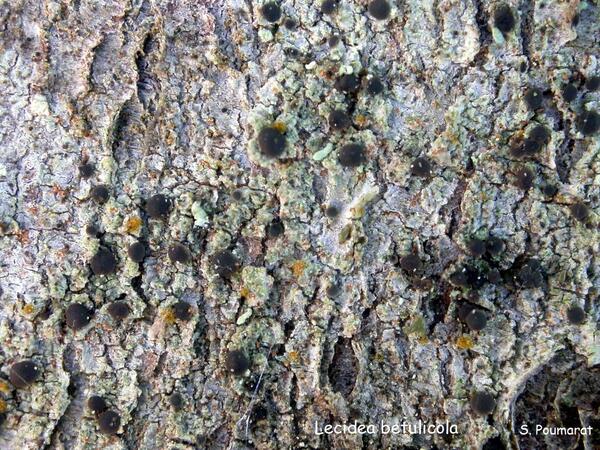Lecidea betulicola (Kullh.) H. Magn.
Förteckn. Skandin. Växter, 4: 32, 1936. Basionym: Biatora betulicola Kullh. - Not. Sällsk. Fauna Fl. Fenn. Förh., n. ser. 11: 275, 1871.
Synonyms: Lecidea betulicola (Kullh.) H.Magn.; Lecidea epiphaea Nyl.; Lecidea lignaria (Körb.) Nyl.; Lecidea plusiospora Th.Fr.
Description: Thallus crustose, thinly episubstratic, grey-white to greenish white, slightly shiny, continuous, finely rimose to verrucose, without a distinct prothallus. Apothecia biatorine, round to irregular in outline, slightly constricted at base, 0.2-0.5 mm across, with a an orange brown, pale grey, bluish grey, brown-black or red-black, flat to convex disc, and a distinctly paler, glossy, finally excluded proper margin. Proper exciple of radially arranged hyphae, colourless or dirty brown to greenish brown in innermost part, without crystals; epithecium poorly differentiated from the hymenium, without crystals; hymenium pale olive-green to greenish brown, the upper part more or less colourless to pale olive-green, 60-75 μm high, I+ blue, K-, N-; paraphyses conglutinated and tightly adhering to the asci, mostly simple, not or only slightly thicker at apex (c. 3-4 μm); hypothecium colourless in lower part, olive-green to dirty brown in upper part, 75-100 μm high, K-, N-. Asci (8-)12-16-spored, with a thin, cylindrical axial mass. Ascospores 1-celled, hyaline, ellipsoid, 6-12(-14) x 2.5-4(-5) μm. Photobiont chlorococcoid. Spot tests: thallus K- or K+ pale yellow-orange, C-, KC-, P-. Chemistry: unknown.
Growth form: Crustose
Photobiont: green algae other than Trentepohlia
Reproductive strategy: mainly sexual
Commonnes-rarity: (info)
Alpine belt: absent
Subalpine belt: very rare
Montane belt: very rare
Dry submediterranean belt: absent
Humid submediterranean belt: absent
Padanian area: absent
pH of the substrata:
1 2 3 4 5
Solar irradiation:
1 2 3 4 5
Aridity:
1 2 3 4 5
Eutrophication:
1 2 3 4 5
Poleotolerance:
0 1 2 3
Altitudinal distribution:
1 2 3 4 5 6
Rarity
absent
extremely rare
very rare
rare
rather rare
rather common
common
very common
extremely common
Loading data...
Occurrence data
Predictive map
Growth form: Crustose
Photobiont: green algae other than Trentepohlia
Reproductive strategy: mainly sexual
Commonnes-rarity: (info)
Alpine belt: absent
Subalpine belt: very rare
Montane belt: very rare
Dry submediterranean belt: absent
Humid submediterranean belt: absent
Padanian area: absent
pH of the substrata:
| 1 | 2 | 3 | 4 | 5 |
Solar irradiation:
| 1 | 2 | 3 | 4 | 5 |
Aridity:
| 1 | 2 | 3 | 4 | 5 |
Eutrophication:
| 1 | 2 | 3 | 4 | 5 |
Poleotolerance:
| 0 | 1 | 2 | 3 |
Altitudinal distribution:
| 1 | 2 | 3 | 4 | 5 | 6 |
Rarity
absent
extremely rare
very rare
rare
rather rare
rather common
common
very common
extremely common
Loading data...
Occurrence data
Predictive map







